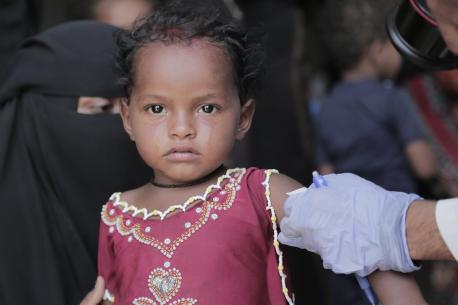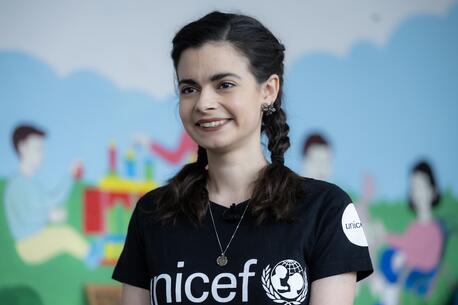
UNICEF's Humanitarian Aid Efforts in Yemen
After six years of conflict, Yemen has become the world's worst humanitarian crisis. Over 20 million people need humanitarian assistance. The conflict, which has left nearly the entire country in ruins, has displaced 3 million people, including 1.58 million children. In addition, 138,000 people have become migrants and 137,000 people are seeking asylum abroad. Approximately 80% of the population is in dire need of care, with no end to the suffering in sight.
Yemeni children are living a nightmare of endless violence and deprivation.
"They're threatened by malnutrition — and deadly disease like diarrhea caused by unsafe water. They face crushing poverty, a ruined economy and now, COVID-19," said UNICEF Executive Director Henrietta Fore as the conflict entered its seventh year. "Basic services — education, health, water and nutrition — have collapsed. Half of all health facilities no longer function. Many have been destroyed. Remaining services are teetering on the edge.”
Nearly 2.3 million children under age 5 are at risk of acute malnutrition this year. It is estimated that 400,000 will suffer from severe acute malnutrition and could die if they do not receive urgent treatment. These cases of severe acute malnutrition are the highest recorded since Yemen's war intensified in 2015.
Fuel shortages have reached crisis proportions, threatening people’s access to food, health services and safe water. Lack of fuel could shut down hospitals and bring water supply operations to a halt, contributing further to the transmission of COVID-19.
UNICEF has helped save more children's lives than any other humanitarian aid organization by providing low-cost, effective measures to combat preventable diseases and illness. But in Yemen, war has compromised many of those services. Immunization coverage has stagnated at the national level, with 37 percent of one-year-olds missing routine vaccinations. As a result, the country is seeing regular outbreaks of measles, diphtheria and other preventable diseases. In 2020, Yemen confirmed 16 cases of vaccine-derived poliovirus.
Yemen's children don't merely suffer the effects of war. Thousands have been maimed, killed or recruited by armed groups since the war began in 2015. As conflict in certain governorates has intensified, so have the fatal threats to children.
“A growing wave of violence across Yemen continues to take a devastating toll on children, with eight children confirmed killed and 33 more injured in a series of attacks since the beginning of the month," said Philippe Duamelle, UNICEF Representative to Yemen, in response to deadly assaults that occurred in March, 2021. "These verified incidents occurred as conflict intensifies along active frontlines in Taizz and Al Hudaydah governorates."
UNICEF’s humanitarian aid in Yemen
In 2021, UNICEF is working toward significant results for children and families, including:
- Admiting 289,402 children for severe acute malnutrition treatment and providing 1.8 million kids under 5 vitamin A supplements every six months
- Vaccinating 5.5 million children against polio
- Providing 6.1 million women and children with assistance to mitigate, prevent and heal from gender-based violence
- Seeing that 2.5 million women and children can receive primary health care services at UNICEF-supported health care centers
- Providing 6.8 million people with sufficient, safe water for drinking, cooking and personal hygiene
- Ensuring that 850,000 children can participate in formal and nonformal education and early education
- Helping 2.1 million children receive explosive weapons-related risk education and getting those who are injured the assistance they need to recover
- Giving 900,000 children and caregivers access to mental health and psychosocial support
UNICEF is working hard to realize these ambitious plans, but a $400 million funding gap threatens to deny Yemen's children the lifesaving assistance they so desperately need. Please help.
Top photo: Hoda, 2, is screened for malnutrition by a UNICEF mobile medical team in rural Hajjah governorate. © UNICEF/UNI313428


